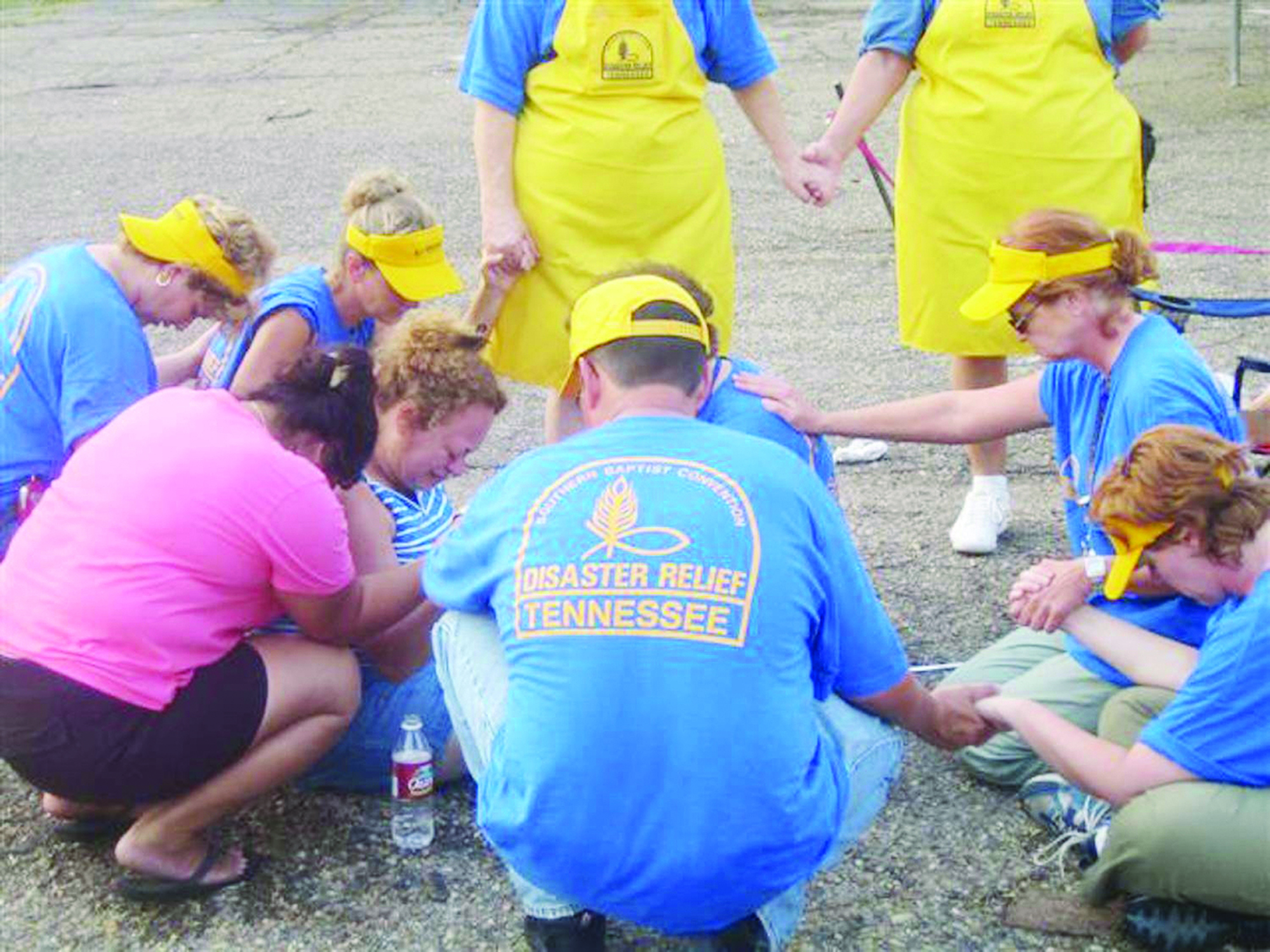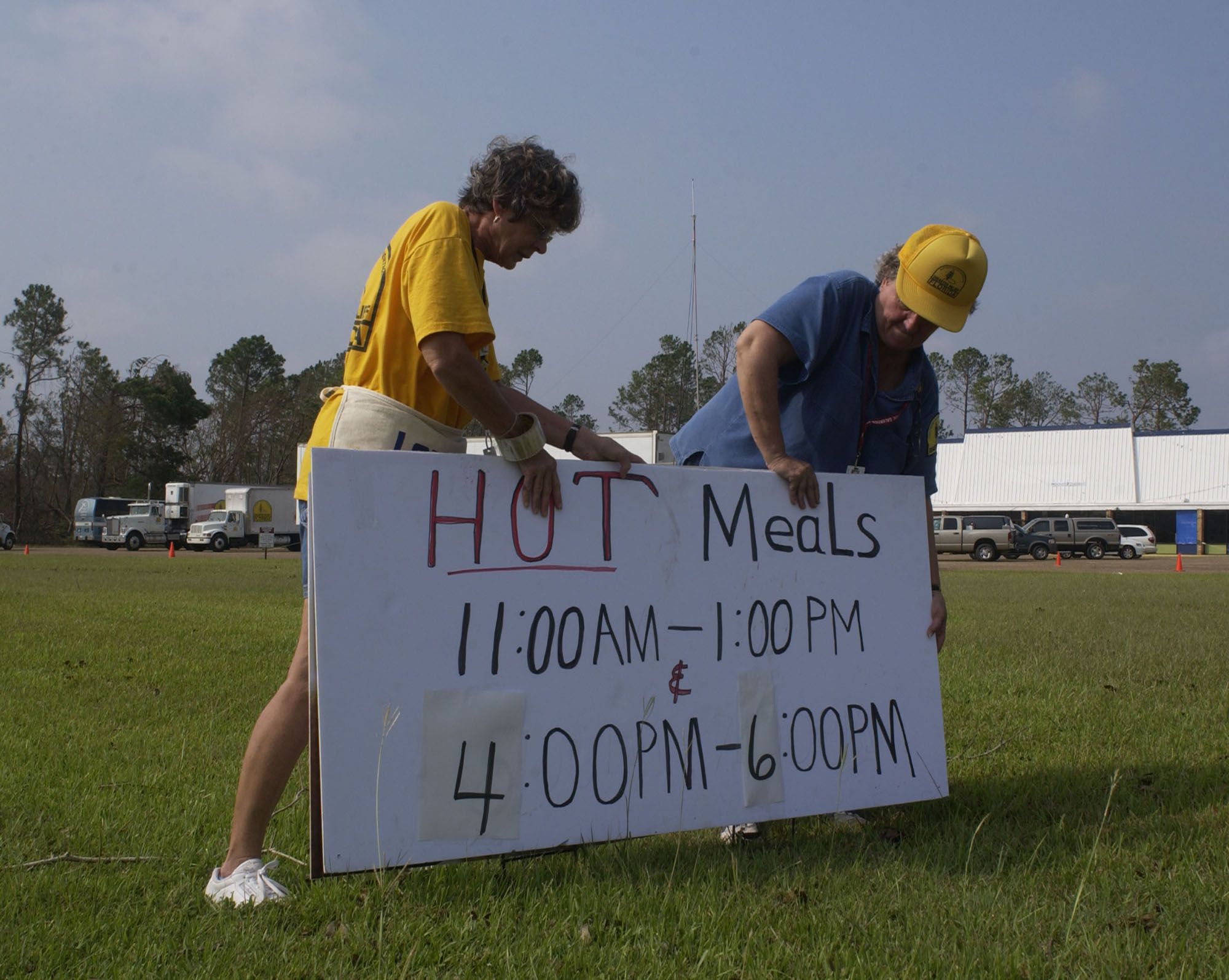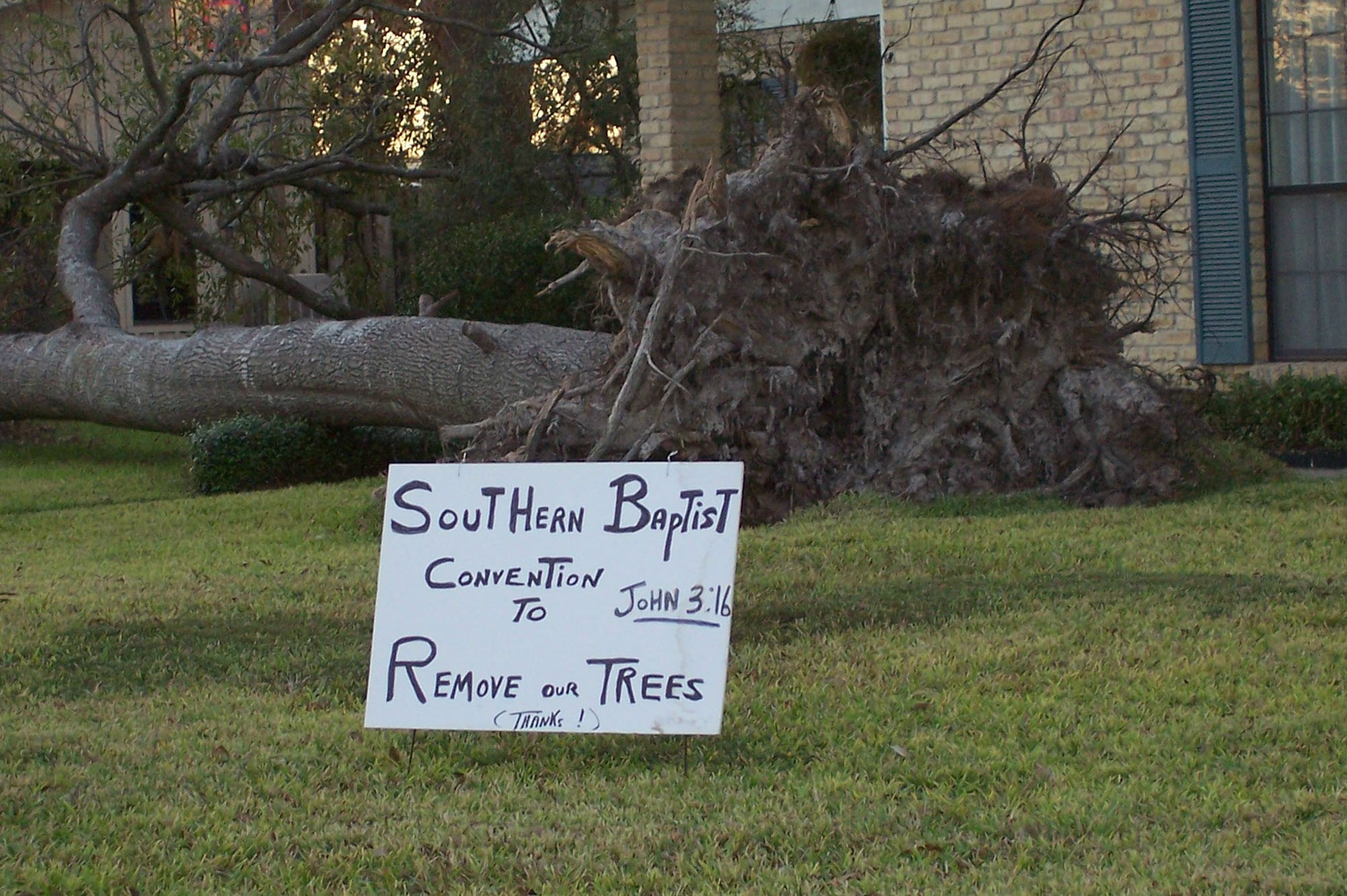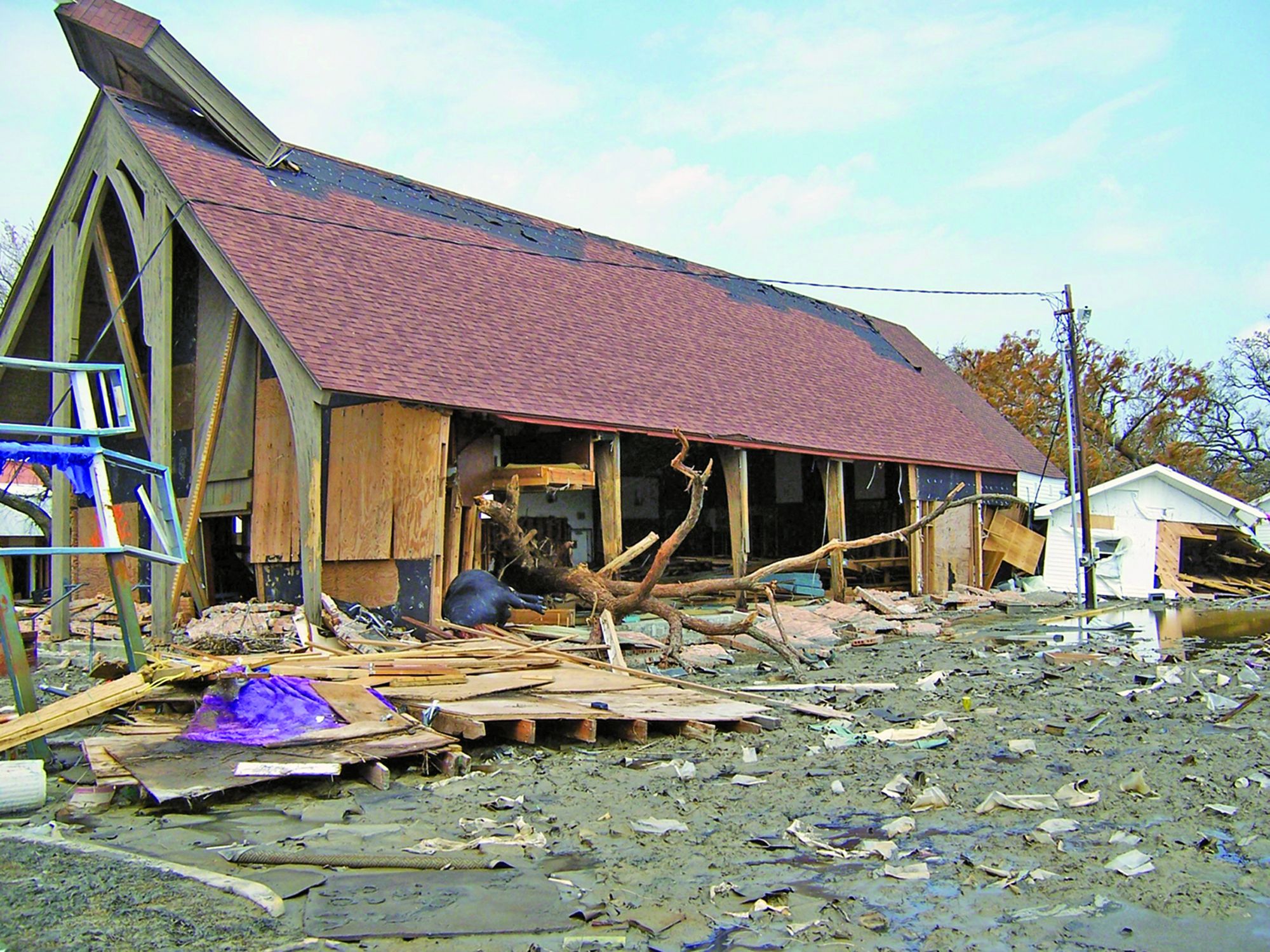
LAKE CHARLES, La. (BP) — Entire towns were wiped away in “the Forgotten Storm” 10 years ago. Fishing villages were smashed beyond recognition in an area known for its seafood and recreational fishing. The stench of dead shrimp and fish hung in the air.
Hurricane Rita, the fourth most intense Atlantic hurricane ever recorded, made landfall between Johnson Bayou, La., and Sabine Pass, Texas, as a Category 3 hurricane on Sept. 24, 2005, with 120 mph winds and a 17- to 20-foot storm surge that sent saltwater as far as 10 miles inland.
The hurricane caused 125 deaths, mostly during the evacuation. An estimated 10,000 homes and dwelling sites were destroyed. Roads were impassable, tangled with fallen trees and downed power lines. Cars and trucks floated down flooded streets and the only means of getting around was by boat. Livestock by the hundreds were left stranded. The wind and storm surge was powerful enough to unearth more than 350 graves — sending one casket 33 miles inland.
Yet the nation’s attention, then and now, was on Hurricane Katrina, which — four weeks before Rita — made landfall on Aug. 29 across the Mississippi Gulf Coast and greater New Orleans.
In the aftermath of Katrina, some 2,000 newspapers wrote more than a half-million stories about the storm for more than two years. Rita, on the other hand, garnered national headlines for only a few days.
 But the people of southwest Louisiana, especially members of Southern Baptist churches and disaster relief teams, didn’t wait for help to show up, though they were exhausted from having spent three weeks helping others in New Orleans and surrounding areas.
But the people of southwest Louisiana, especially members of Southern Baptist churches and disaster relief teams, didn’t wait for help to show up, though they were exhausted from having spent three weeks helping others in New Orleans and surrounding areas.
“The thing that stands out to me,” said Bert Langley, director of missions for Louisiana’s Evangeline and Gulf Coast Baptist associations when Rita hit, “in spite of the damage many of our churches sustained, they still continued to take in folks.
“They exemplified Christ in the midst, during and after the storm,” Langley said. “It would have been easy for them to say, ‘Look, we’ve got our own problems,’ but they didn’t. They faithfully served all those who had a great need.”
Besides the herculean efforts of local churches, Louisiana Baptist Convention and disaster relief volunteers from other states were in place before other organizations could set up.
“The convention and the North American Mission Board made a great impact on this area and our community,” said Bill Holifield, pastor of First Baptist Church in Vinton at the time and now pastor of Colyell Baptist Church in Livingston. “By Thursday, when FEMA finally started arriving, we had already set up several [Southern Baptist] DR teams, the Red Cross and NAMB teams at our church.”
 A feeding team and chainsaw crew of Arkansas Baptist volunteers had arrived. Chainsaw teams soon followed from Kansas, North Carolina, Pennsylvania, Texas, Tennessee, Florida and Alabama along with 75-plus student volunteers from Ouachita Baptist University in Arkadelphia, Ark.
A feeding team and chainsaw crew of Arkansas Baptist volunteers had arrived. Chainsaw teams soon followed from Kansas, North Carolina, Pennsylvania, Texas, Tennessee, Florida and Alabama along with 75-plus student volunteers from Ouachita Baptist University in Arkadelphia, Ark.
The parking lot at East Bayou Baptist Church in Lafayette became a disaster relief hub, with a Texas feeding unit producing nearly 15,000 meals a day at the Lafayette Cajundome. First Baptist in Lafayette housed doctors and nurses who treated people sheltered at Cajundome as well as Southern Baptist relief workers. Several other churches in the region hosted command centers.
Louisiana’s 10 Baptist encampments played key roles, particularly Dry Creek Baptist Camp and Acadian Baptist Center. Though damaged by the brunt of Rita’s fury and without electricity, water and sewer, the two camps continued to minister to evacuees.
“It was the pinnacle of ministry for us,” said Todd Burnaman, director of Dry Creek. “Rita changed our lives, made us stronger and better. It taught us how to do hurricane ministry.”
 Bruce Baker, director of missions for the Carey Baptist Association in southwest Louisiana, recounted, “We had churches from throughout the state and country to help. And we had churches help each other. We saw the best of Christian community through that.”
Bruce Baker, director of missions for the Carey Baptist Association in southwest Louisiana, recounted, “We had churches from throughout the state and country to help. And we had churches help each other. We saw the best of Christian community through that.”
Prior to the hurricane, Brent Cosio, a member of Old Anacoco Baptist Church in Leesville, reflected, “We sat around, went to Bible study and prayed about reaching out to others many times in our church before Rita. Now, it was time to do it. Our church was focused on something more than just their own personal needs. We were willing to do what Christ commanded.”
“Everybody was touched in some way by Rita,” said Steve James, pastor of Trinity Baptist Church in Lake Charles. “Some people only lost a shingle, others their whole house. But through it all, God was good in providing the materials and manpower for us, as a church, to reach out to our own church family and the community. Every day we had teams cleaning up yards, putting down blue tarps, repairing roofs, cutting away downed trees, stacking and hauling away debris and rubbish and feeding people.”
Grand Caillou Baptist Church in Houma served more than 800 people each day as a distribution point in the initial emergency response for much-needed drinking water, emergency food supplies, cleaning materials, Red Cross meal distribution and spiritual support. Then, for the next year, the church housed and coordinated efforts for more 300 volunteers who came to assist in mud-out, cutting down trees, clearing debris from homes and property and various construction projects. Other groups assisted in providing hot meals, sharing Bibles and giving away tracts. Volunteers also went house to house praying for and encouraging people who were engulfed in a sense of overwhelming despair.
“As a result, our church became known in the community as one of the only places people could turn to when the local government agencies failed them, FEMA failed them, and things seemed hopeless,” said Marcell McGee, pastor of the church at the time and now pastor of Mt. Union Baptist Church in Spearsville.
Holifield said 43 people accepted Christ as a result of chainsaw teams and other churches’ ministry in the Vinton area.
Among them: an 88-year-old man whose granddaughter was a member of Crossroads Baptist Church in Vinton. The congregation had been praying for him for many years. As a chainsaw team was removing a tree off his home, they shared Christ with him, and he prayed to receive Christ in his front yard.
Holifield told of a man who accepted Christ during one of two worship services the chainsaw teams held each day — and then led his son to Christ. The two were baptized on Dec. 25, 2005.
“The days in the latter part of September and the following year proved to be very trying ones for the small town of Vinton,” Holifield said, “but by the grace of God that was brought to us by the many volunteers who helped us, Vinton not only survived but today it thrives and is continuing to grow both in population and in spiritual development. The bonds forged in those trying days have proven to be unbreakable and the people have proved to be unstoppable.”
Philip Robertson, president of the Louisiana Baptist Convention at the time, said the state’s Baptists “came together, loved one another and helped one another. It was a time of … doing what God calls us [to do] as the body of Christ.
“… In some ways that coming together has continued on,” said Robertson, pastor of Philadelphia Baptist Church in Deville which hosted primarily Katrina evacuees. “You look at the last 10 years in the Louisiana Baptist Convention and I think we have been moving forward. Those two storms perhaps facilitated it.”
In the predominantly Catholic town of Gueydan where Katrina and Rita evacuees were being sheltered at the civic center, First Baptist Church joined churches of other denominations to provide clothing.
In the months that followed, a vast operation developed. Donations poured into town and there was such an abundance of leftover items that First Baptist opened a clothing ministry in October 2006, long after evacuees had left. The church expanded the ministry in 2013 when a second building was added to accommodate the growing need.
Now, First Baptist’s clothing ministry averages 3,500 items a month in sales, though that number has reached as many 5,000 items some months, with the proceeds used to help pay for utilities for needy families.
Butch Guidry, a Baptist disaster relief leader from Sulphur, La., said the newly formed chainsaw unit of the Carey Baptist Association was only the third in the state when Katrina made landfall.
“Now we have between 45 and 50 units. Katrina and Rita were definitely a benchmark for disaster relief,” Guidry said. “Those two storms led to more, better training for our units. We learned a lot and saw where we could do better.”
More than 5,000 chainsaw work orders were on a waiting list for Baptist volunteers after Rita. “There was just so much damage and devastation,” Guidry said. “We worked on the weekdays and the weekends … virtually every weekend … through Christmas. We would not finally exhaust all the work orders until after Easter — seven months after Rita slammed into the Louisiana coast.
“… But to sustain this ministry we need an infusion of new blood because a lot of our members are getting old,” Guidry said. “I tell potential prospects all the time there is nothing greater that they can do but serve. This ministry provides for all levels of society … from the poorest to the wealthiest.
“What would it have been like had we not had these units after Rita, I don’t even want to think about it,” Guidry said.
In Texas, similar disaster relief was afoot after Rita.
First Baptist Church in Vidor had lost electricity like most in the region but nevertheless began taking in those left homeless by the hurricane, along with relief volunteers and Federal Emergency Management Administration officials. In the days immediately following the storm, however, a hot meal was hard to find.
So Bettye Leslie stepped up. Her 12-hour-a-week job as coordinator for First Baptist’s Wednesday evening meals became an 80-hour-a-week endeavor into the following year.
Initially food for the meals came from church members. “We ate pretty good at first,” Wright said of the bounty from the defrosting freezers of the region’s hunters and shrimpers.
Once they quickly consumed that supply, help came from sister churches, including three in Houston. First Baptist provided a generator to power parts of the church; Second Baptist contributed funds to buy groceries; and, from October through Christmas, Sagemont Church sent daily deliveries of “anything we needed.”
As First Baptist became a hub for incoming assistance, it drew those seeking help. One group in particular caught pastor Terry Wright’s attention — elderly widows who had dropped their homeowners insurance in order to meet more pressing financial demands and were without the means to make repairs. Without help, the women would remain homeless.
Local believers, through God’s providence, were ready to step in. Prior to Katrina and Rita, the Golden Triangle Baptist Association had been planning a construction ministry named Nehemiah’s Vision to build and repair churches. Those plans were put on hold and the ministry instead deployed teams to the poor, widowed and handicapped whose homes were damaged beyond their means to repair.
The home of Dorothy Howell, a widowed pastor’s wife and First Baptist Sunday School teacher, was the first to be repaired.
“I feel so loved,” the 91-year-old Howell said. “If there was ever anything I needed, my church would be there to help me.”
Wright said the work of Nehemiah’s Vision saw not only homes but lives restored. Some homeowners made professions of faith and others who had fallen away from God and the church returned because of the witness of the 35,000 volunteers who served between 2005-11.
During the six-year span, the nonprofit organization repaired or completely rebuilt 1,200 homes in the wake of Hurricane Rita and also 2008’s Hurricane Ike, which caused similar devastation across southeast Texas. Today, the ministry is officially inactive but can be up and running in a matter of hours should the need arise.
First Baptist’s members “worked on homes of people they never knew. They fed people,” Wright said. “Our people served and they sacrificed.”

















